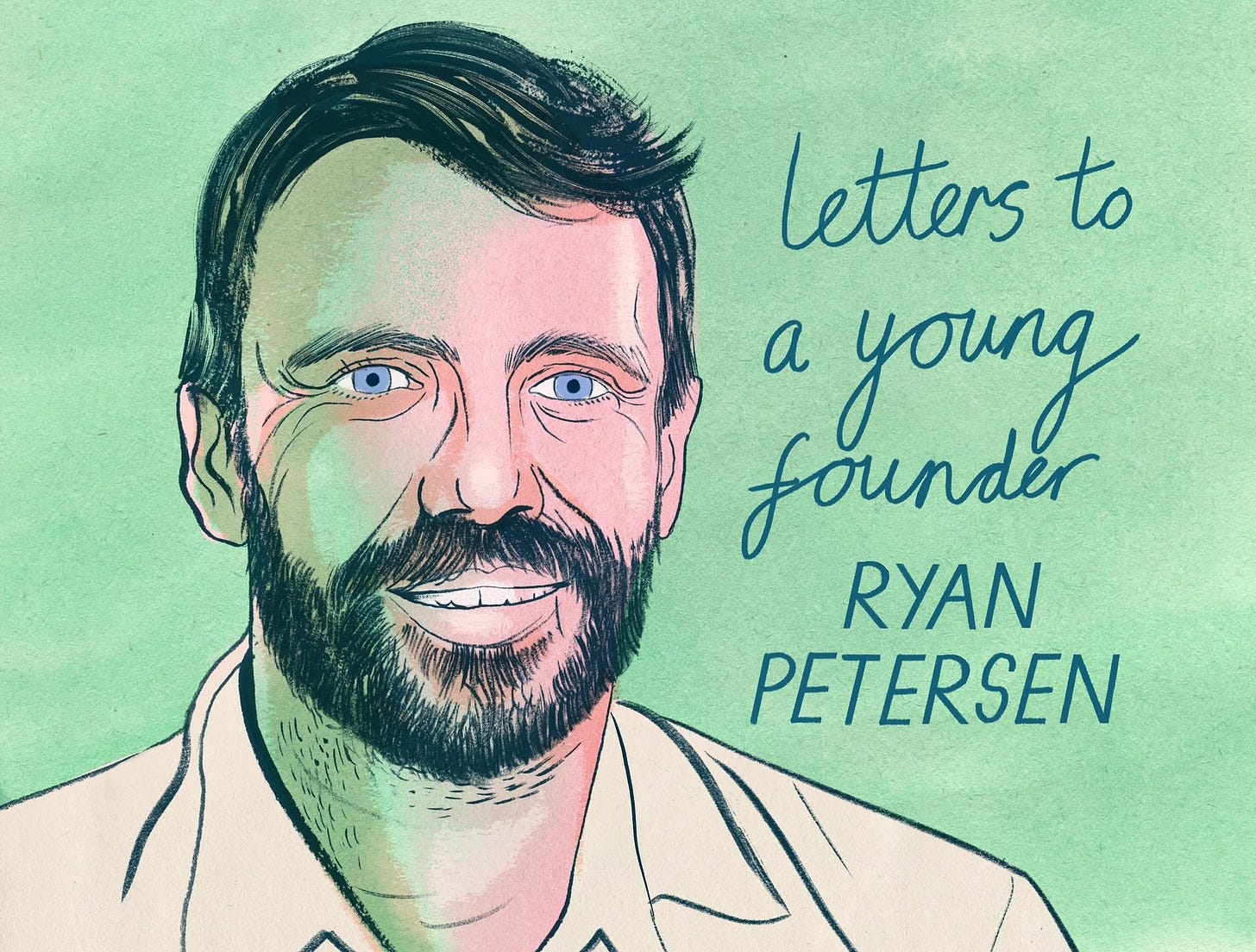Leading Through a Crisis with Ryan Petersen
How Flexport's CEO Reclaimed His Company and Righted The Ship.
"The Best Venture Firm You've Never Heard Of is the best piece of writing I've ever read online, and I read a lot of stuff. Personally recommend it to all my friends." — Kaan, a paying member
Friends,
No company follows precisely the same path as another. But certain patterns repeat. One is the Napoleonic Return: a CEO leaves the company they have founded – either by choice or force – only to reclaim their position after a period away. After being forced out by Apple’s board in 1985, Steve Jobs spent 12 years in the wilderness, building NeXT, before returning to power. Howard Schulz stepped back from leading Starbucks at the turn of the millennium, reappearing eight years later when the financial crisis roiled the coffee maker. In 2004, Michael Dell passed the reins to his COO before seizing them back three years later.
Few have pulled off the Napoleonic Return quite as quickly as Ryan Petersen. (His only better in this regard is Sam Altman, whose coup lasted a mere five days). In March of 2023, former Amazon exec Dave Clark became the sole CEO of Flexport, taking over from its founder. Just seven months later, he was out.
Much was written about the move at the time, but not since. In today’s final letter with Ryan Petersen, he shares what happened from his perspective, walking through what went wrong, why he needed to return, how he stabilized a flagging organization, and the hard decisions made in the process. It’s an intimate look at the strategic and emotional impact of a founder reclaiming control over their company – invaluable for entrepreneurs and investors.
To hear the full story and unlock the rest of The Generalist’s exclusive interviews, case studies, and databases, join our premium newsletter, Generalist+. You'll get unfettered access to our best work for $22 per month or $220 per year. Level up your investing and operating for the price of a business lunch.
Brought to you by Mercury
Companies are only hiring AIs. You need VC money to scale. This economy is bad for business.
If you’ve fallen for any of these oft-repeated assumptions, you need to read Mercury’s data report, The New Economics of Starting Up. Mercury believes banking* should do more for businesses, like provide them with the intel they need to succeed. So, they surveyed 1,500 leaders of early-stage companies across topics ranging from funding, AI adoption, hiring, and more, to set the record straight.
What they discovered is equal parts surprising and encouraging:
79% of companies surveyed, who have adopted AI, said they’re hiring more, not less, because of it.
Self-funding is the number one avenue for accessing capital — even for tech companies, with half likely to bootstrap.
87% of founders are more optimistic about their financial future than they were last year, despite prevailing uncertainties.
To uncover everything they learned in the report, click the link below.
*Mercury is a financial technology company, not a bank. Banking services provided through Choice Financial Group, Column N.A., and Evolve Bank & Trust; Members FDIC.
Mario’s letter
Subject: Leading through crisis
From: Mario Gabriele
To: Ryan Petersen
Date: Monday September 1 2025 at 10:02 AM GMT
Hi Ryan,
I’m sure I’m going to be sending your previous letter to many founders in the years to come. It was full of so many interesting lessons about fundraising, finding talent, and thinking through acquisitions.
I’m especially grateful for the frankness with which you share the challenges Flexport has endured to reach its current position. The more companies and CEOs I study, the more I learn that these moments are not simply commonplace, but inescapable. It seems to be one of the prices you pay in pursuit of greatness.
That brings me to the subject of today’s correspondence: leading through a crisis. Though some of the episodes discussed in our last letter certainly sound troubling, Flexport’s most significant crisis seems to have been the unsuccessful appointment of Dave Clark as CEO, and the associated fallout.
You will need no reminder of the particulars of this story, but I’ll give a brief recap for the benefit of readers. I apologize for having you relive what may not be your favorite period to reflect upon!
Here we go: On June 8, 2022, Flexport announced that Dave Clark would be taking over as CEO starting in September. It was seen as a strong fit given Clark’s 23 years at Amazon, where he’d been pivotal in building out the company’s fulfillment network. He’d ultimately risen to become CEO of Worldwide Consumer.
You had a thoughtful plan for the transition: Clark worked alongside you as co-CEO for six months before he officially took the reins in March 2023. At that point, you moved into an Executive Chairman role, and not long after, you also became a Partner at Founders Fund.
Shortly after the official hand-off, Clark made a few significant changes, acquiring Shopify’s logistics business (including Deliverr) and adding senior executives from his Amazon days, like Teresa Carlson.
He did not last much longer. As the story goes, at least, Clark submitted his resignation on September 5, 2023. Flexport’s board then rejected Clark’s resignation, preferring to fire him for cause the very next day. You stepped back into the CEO role, and the next few days (and weeks) got a bit messy with some back and forth in the press.
I can’t imagine how intense that period was from your perspective. You had to step back into the breach during a period of chaos, stress, and disharmony. You had new employees to win over, and old ones to re-align. I would imagine that you had customers confused by the change, and perhaps a few fractious investors breathing down your neck.
What did it feel like? How did you protect your clarity and decision-making? Given that you’d intended to take a less active role for the foreseeable future, was it difficult to ramp back up as CEO? What was the state of the company that you inherited?
Tactically, what did you prioritize upon your return? Which steps did you take immediately, and which did you have to delay? As much as possible, I’d love to understand what you did to pull the company through this crisis and the lessons you learned from it. Has it changed the way you lead today?
I’m grateful for your willingness to discuss this with me, and I'd like to thank you very much for taking part in this series. I’ve really enjoyed it.
Best,
Mario
PS – Given the omnivorous learning habits you mentioned in our last letter, I wondered if there was one book, or piece in particular, that you refer back to most often?
Ryan’s letter
Subject: Leading through crisis
From: Ryan Petersen
To: Mario Gabriele
Date: Tuesday September 9 2025 at 7:38 PM GMT
Hi Mario,
It was a tough period.
I realized we had to make a change when I started hearing from people at Flexport. There are a lot of people that love this company and want it to succeed, and they weren’t happy with the way things were going under Dave. I started getting dozens and dozens of phone calls and in-person meeting requests from employees wanting to talk to me.
Their concerns went beyond the P&L, which was ultimately the main driver of the board’s decision to change Dave out. The board’s rationale was clear, they said “Hey, you guys have to change direction here. You have to both cut costs and grow.”
That’s a very difficult maneuver. It’s not just about firing people, you have to let the right people go. It’s really hard to do that without the right context on the company and the team. No one has more context than the founder; I’m fused at birth with Flexport. The board wanted someone to do this surgery, and it became clear it had to be me. It actually wasn’t my decision to come back – the board unanimously voted.
By the time that all happened, I’d already spoken to a lot of the employees who had come forward. I’d heard that our quality had fallen off, that we weren’t growing, and that things were going wrong. So I had some context, maybe even before the board.
Dave is a very credible and very certain person. He was also wrong about important parts of the business. But because of that credibility and certainty, it was hard to know he was wrong. Even if you think something’s off, when you talk to him, you allow your anxiety to get tamped down.
Coming back was incredibly hard and incredibly rewarding at the same time. We had to figure out how to cut costs and improve quality simultaneously, get a culture back that had been put through so much change, let customers know that we were going to stick around, and manage a PR disaster.
That last part was a totally unforced error that didn’t need to happen. A former employee made up lies about Dave, which they shared with a reporter. When the reporter told Dave that “someone close to Flexport” had said these things, he thought the company was making things up about him, got mad, and started trashing the company. Suddenly, we had the kind of story the media loves, with people talking shit about each other.


